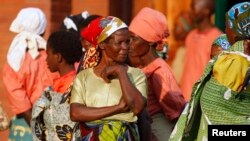BLANTYRE, MALAWI —
A Malawian women empowerment NGO known as the Center for Alternatives for Victimized Women and Children has been working to help poor, widowed and abused women become economically independent through village savings and loans programs.
According to NGO officials, under the initiative, known as village banking, the women are encouraged to form groups of between 15 and 25 people to contribute an agreed upon amount of money weekly to buy shares.
“We encourage each member in that group to borrow the money [to start a business of her choice]. There is no collateral because they know each other and we even don’t impose interest on them," explained Hlazulani Malumbo Ziba, the NGO facilitator in the southern district of Chiradzulu, one of the areas where the project is being implemented.
"They decide themselves what type of interest percentage each member should be giving after borrowing the money," he added.
Ziba said the interest charged is later added on to the amount of money an individual member receives during the time of sharing the money, which is saved throughout the year.
“We promote that the interest should be of the individual member who is borrowing because we wanted them to participate in the borrowing, because through the borrowing money will be increasing at the end of the day,” he noted.
According to Ziba, more than 5,000 women from 81 villages have benefited from the program, which began in 2010.
Eunice Victory is the coordinator of a savings and loans project in areas surrounding Chingoli village. A widowed mother of two, Victory said she joined the program in 2011 because she was living in poverty following the death of her husband and had no means of paying her children's school fees.
“The very first day I joined the group I borrowed about MK10,000 which I used to start a business of selling fritters because at first I had nothing to do," she explained. "Now I am able to find simple things that I was missing and also I am able to find all the basic needs in life. For example, I have been able to build a house, which you see here.”
She also said through the program she has managed to pay school fees for her two daughters, one of whom is pursuing medical studies.
The program, however, has faced challenges.
Maxwell Kaliati, programs manager at the program's head office in Blantyre, said one challenge is keeping the money safe, especially when it is being collected, because it is not kept in commercial banks.
“Despite that, we encourage people that when they save, they should borrow immediately; sometimes they have the money which remains with them in the cash box, so there are fears the thieves would come into their homes and rob them of their monies," Kaliati said. "Although we haven’t seen such a robbery case, this is the challenge.”
He added that to address the challenges, a meeting with police officials from surrounding areas is being arranged so the two sides can develop a working relationship and deter potential thieves.
According to NGO officials, under the initiative, known as village banking, the women are encouraged to form groups of between 15 and 25 people to contribute an agreed upon amount of money weekly to buy shares.
“We encourage each member in that group to borrow the money [to start a business of her choice]. There is no collateral because they know each other and we even don’t impose interest on them," explained Hlazulani Malumbo Ziba, the NGO facilitator in the southern district of Chiradzulu, one of the areas where the project is being implemented.
"They decide themselves what type of interest percentage each member should be giving after borrowing the money," he added.
Ziba said the interest charged is later added on to the amount of money an individual member receives during the time of sharing the money, which is saved throughout the year.
“We promote that the interest should be of the individual member who is borrowing because we wanted them to participate in the borrowing, because through the borrowing money will be increasing at the end of the day,” he noted.
According to Ziba, more than 5,000 women from 81 villages have benefited from the program, which began in 2010.
Eunice Victory is the coordinator of a savings and loans project in areas surrounding Chingoli village. A widowed mother of two, Victory said she joined the program in 2011 because she was living in poverty following the death of her husband and had no means of paying her children's school fees.
“The very first day I joined the group I borrowed about MK10,000 which I used to start a business of selling fritters because at first I had nothing to do," she explained. "Now I am able to find simple things that I was missing and also I am able to find all the basic needs in life. For example, I have been able to build a house, which you see here.”
She also said through the program she has managed to pay school fees for her two daughters, one of whom is pursuing medical studies.
The program, however, has faced challenges.
Maxwell Kaliati, programs manager at the program's head office in Blantyre, said one challenge is keeping the money safe, especially when it is being collected, because it is not kept in commercial banks.
“Despite that, we encourage people that when they save, they should borrow immediately; sometimes they have the money which remains with them in the cash box, so there are fears the thieves would come into their homes and rob them of their monies," Kaliati said. "Although we haven’t seen such a robbery case, this is the challenge.”
He added that to address the challenges, a meeting with police officials from surrounding areas is being arranged so the two sides can develop a working relationship and deter potential thieves.




